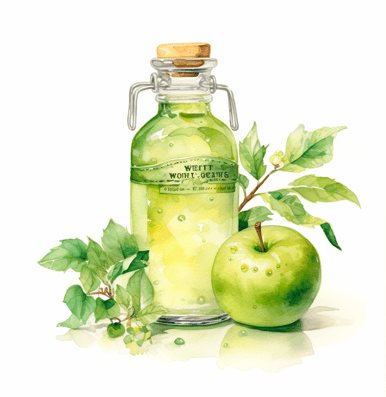
Does apple cider vinegar cause acne? Let’s see how this natural remedy might not always be skin’s best friend, especially if you’re aiming for that flawless glow.
Hi, I’m Hazel
I gave up on skincare after years of issues with acne and sensitive skin.
But after going plant-based, my skin cleared up and even started to glow. Now I help women reveal their natural beauty with simple, delicious plant-based food.
I also used to be a nurse, and love nerding out on nutritional science (high-quality science, that is).

As usual, this post is based on the strongest nutritional evidence I could find with a focus on the simplest, most delicious foods
…because who has time to waste on anything less?
The quick version:
Apple cider vinegar contains organic acids such as malic acid and alpha hydroxy acids, which can help remove dead skin cells and promote healthier skin. However, undiluted apple cider vinegar can cause skin irritation or chemical burns, particularly in sensitive or acne-prone skin.
Apple Cider Vinegar and Skin Health
Apple cider vinegar (ACV) is touted for its numerous health benefits, but its impact on skin is a mixed bag.

Known for containing organic acids such as malic acid and alpha hydroxy acids, ACV can help exfoliate dead skin cells and promote healthier skin.
That’s good for acne, right?
Acidity and Your Skin
The acids in ACV are double-edged swords. While they can brighten and clarify by removing dead skin cells, their high acidity can disrupt your skin barrier function, especially if your skin type leans towards sensitive or acne-prone skin.
Risks of Strong Solutions
Using undiluted apple cider vinegar can be a risky affair.
It can cause severe skin irritation or even chemical burns. That’s the last thing you want when you’re already struggling with acne vulgaris.
Individual Reactions Vary
Each person’s skin reacts uniquely to different substances, and ACV is no exception. For some, it may increase the development of acne leading to acne breakouts, especially if the skin’s natural acidity is already out of balance.
The Role of Bacteria
On a positive note, ACV is thought to target acne-causing bacteria like propionibacterium acnes, but it’s important to remember that not all bacteria are harmful. Disrupting the skin’s microbial balance can lead to more skin issues, undermining efforts to achieve healthier skin.
Preventive Measures When Using ACV
If you’re willing to try out apple cider vinegar for acne, you need to be careful with your use of apple cider vinegar to avoid unwanted side effects.

Here are some tips to help you use this potent natural remedy safely.
Safe Dilution Practices
Always dilute ACV before applying it to your skin.
A safe ratio is one part apple cider vinegar to four parts water, which can reduce the risk of irritation and protect your skin barrier function.
Spot Testing Is Crucial
Before fully incorporating ACV into your daily routine, perform a patch test.
Apply a small amount of diluted ACV to a discreet area of your skin using a cotton ball. This spot treatment helps ensure your skin can handle ACV without adverse reactions.
If your skin appears to tolerate it well and you don’t think there is any risk of skin damage, then continuing apple cider vinegar for clearer skin may work for you.
What to Avoid
Integrating apple cider vinegar (ACV) into your skincare routine can offer benefits, but it’s crucial to know what to avoid to protect your skin care practices and maintain healthy skin.
Avoid High Concentrations
ACV contains acetic acid, which can be harsh on the skin if used in high concentrations. Always dilute ACV appropriately to reduce the potential side effects like irritation and dryness.
Do Not Apply to Open Wounds
Never apply ACV to open wounds. Its acidic nature can cause significant irritation and delay healing, potentially leading to skin damage and infection.
Steer Clear of Sensitive Areas
Avoid using ACV around the eyes, inside the nose, and on other particularly sensitive areas where the acetic acid could cause severe irritation or burns.
Monitor for Adverse Reactions
Even with proper dilution, some people may experience adverse reactions to ACV. Discontinue use immediately if you notice any negative effects, such as increased redness, burning, or itching.
How to Incorporate ACV Safely in Your Skincare Routine
Using apple cider vinegar for healthy skin can be beneficial if done correctly. Here’s how to harness its properties effectively without risking your skin’s health.

First, apply apple cider vinegar after your facial cleanser.
Make Your Own ACV Toner
Create a balanced apple cider vinegar toner by mixing part vinegar with several parts water. This diluted solution can help manage oiliness and clarify your skin gently, avoiding the harsh effects of undiluted apple cider vinegar.
How Often Should I Use ACV in My Skincare Routine?
Start slowly by incorporating your diluted apple cider vinegar toner 2-3 times per week. Depending on your skin’s reaction, especially if you have sensitive skin or acne-prone skin, you may have to reduce this further. But if not, then you increase the frequency as needed.
You may also like:
5 Easy Vegan Foods to Treat Your Acne
Can apple cider vinegar cause acne?
It can, particularly if used improperly or if your skin type doesn’t respond well to its acidic nature. However, with careful use, ACV can be part of a healthy skincare routine, potentially leading to clearer skin. To reap the benefits of ACV without the drawbacks, always prioritise gentle application and proper dilution. Tailor its use to suit your specific skin conditions, and never hesitate to consult with a dermatologist if you experience adverse effects.
FAQ: Does apple cider vinegar cause acne?
Apple cider vinegar sparks a lot of questions regarding its efficacy and safety. Here are answers to some common queries.
Can ACV Replace Professional Acne Treatments?
While ACV can help with mild acne breakouts, it is not a substitute for best acne treatments prescribed by professionals. It should complement treatments rather than replace them.
Is Organic Apple Cider Vinegar Good for Weight Loss?
Yes! There is strong scientific evidence that ACV (organic or not) assists with weight loss, specifically with abdominal fat.
References
Most references below will link to the original peer-reviewed study itself. However, sometimes I will link to a video over at NutritionFacts.org instead, which is by far the single best resource of brutally transparent nutritional evidence you will ever see. Dr Greger tells a great story about the realities of the science and if I think you will benefit more from one of his videos, the link will take you there instead.
Happy nerding!